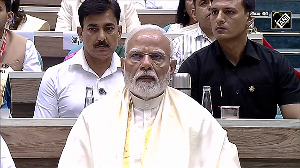
The Bombay high court on Friday dismissed a public interest litigation against the Central Bureau of Investigation's decision to not challenge a 2014 trial court order discharging Bharatiya Janata Party chief Amit Shah in the Sohrabuddin Shaikh encounter case.
A "stranger" who is not a complainant or a victim in the case cannot interfere, said a division bench of Justices Ranjit More and Bharati Dangre, adding that the petitioner organisation here had no "locus" (right to intervene).
The petition was filed by a group, Bombay Lawyers Association, questioning the Central Bureau of Investigation's decision not to challenge the discharge granted to Shah in the case.
"The Code of Criminal Procedure does not permit any interference at the instance of a stranger who is neither a complainant/informant or a victim in a case," the bench said in its judgment.
"Since a crime is considered as against the society, it is the state alone which is competent to investigate and prosecute the said crime by following the procedure set out in the Code of Criminal Procedure," it said.
A special CBI court had in 2014 discharged Shah in the case.
Sohrabuddin Shaikh and his wife Kausar Bi were killed in an alleged fake encounter by the Gujarat Police in 2005.
Shaikh's partner Tulsi Prajapati was killed in another encounter in 2006 by Gujarat and the Rajasthan Police.
Of the 38 people charged by the CBI in the case, 16, including Shah and all senior officers of Gujarat and the Rajasthan Police, were discharged by the trial court and the Bombay High Court.
The association's counsel Dushyant Dave had argued that the CBI had changed its stand on Shah after the change of government at the Centre in 2014.
The petition raised questions over the agency's decision to file revision applications against the discharge of two other accused in the case, but not challenging Shah's discharge.
The CBI had opposed the petition and said its decision was a "conscious and reasonable" move.
Terming the petition as "politically motivated" and a "publicity stunt", the agency had sought dismissal of the petition.
Additional Solicitor General Anil Singh, appearing for the CBI, had told the court that the investigating agency had studied the trial court's order granting discharge to Shah as well as various subsequent orders of appellate courts upholding the same.
"After going through these orders, we decided that the order of discharge did not require any judicial review and hence, we took a conscious decision to not file any applications challenging Shah's discharge from the case," Singh had said.
Dave had argued that the CBI was roped in by the Supreme Court to probe the killings of Shaikh, his wife Kausar Bi and Prajapati as the apex court had reposed its trust in the "independent" agency.
"Hence, the CBI should have been impartial and treated all accused persons in the same manner. Why did it then challenge the discharge granted to police officers N K Amin and Dalpat Singh Rathod, but went quiet in Shah's case," Dave had questioned.
He had said the CBI had opposed the discharge plea filed by Shah before a special court in the city in April 2014, but changed its stand after Shah was discharged in December 2014.
"They had called him (Shah) one of the main conspirators in the case at that time. However, in December 2014, Shah was granted discharge in the case and the CBI changed its stand on his role.
"That is because the general elections took place and the government at the Centre changed. But, isn't the CBI supposed to be impartial irrespective of who is in power at the Centre," Dave had asked.
Countering Dave, Singh had said there was no law that makes it mandatory for the CBI to file appeals or revision applications in case of every discharge.










 © 2025
© 2025